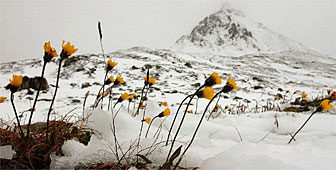Swiss swelter in early summer heat

The month of June has been the hottest June in Switzerland for at least 250 years, according to environmental historians.
The blast of African heat is worrying climate experts, threatening the Alpine ecosystem and making some farmers break out into a cold sweat.
Unheard of temperatures have been recorded in Switzerland over the past month. While heat waves in June have been a recurrent event in recent years, they have never lasted as long as this one.
In Geneva, maximum daytime temperatures have not dropped below 25 degrees since May 29. Most of Switzerland has experienced hot weather for up to 19 days.
Temperatures have been generally six to seven degrees above average for this time of the year.
“It’s the hottest June since 1753, when people started taking measurements,” said Christian Pfister, a professor of environmental history at Bern University.
Climate change
June’s heat wave may be remembered as being exceptional, but it may just be part of a wider trend.
The effects of global warming, which only a few scientists still dispute, seem to be making themselves felt.
Last December, the World Meteorological Organization said that the ten hottest years recorded after 1860 were all since 1987.
Stéphane Bader, a climatologist at MeteoSwiss, confirmed that average temperatures have risen since the 1980s, in summer and winter.
The geosciences department at Fribourg University has already begun considering climate change for the next 100 years.
Using computer simulations, a team of researchers headed by Martin Beniston has come to the conclusion that Switzerland will have a stable, hot and dry tropical climate in 2100.
Global warming has already had an effect in the Alps. Glaciers are shrinking, permanent snow cover is becoming thinner, and steep slopes are more and more unstable.
Pfister reckons that mountainous regions could face droughts during the hottest summers.
Too little rain
A lack of rainfall has been one of the main features of the latest heat wave. “Since the beginning of spring, there hasn’t been enough rain,” Bader told swissinfo.
Switzerland has recorded only one fifth of its usual precipitation since the start of the year.
The combination of heat and a lack of rain has had consequences for Switzerland’s farmers.
“There’s nothing to be worried about yet, but our situation is becoming more precarious by the day,” said Josef Wüst, spokesman for the Swiss Farmers’ Union.
Some vegetables, such as beans, do not grow well in the heat. But farmers will not face a crisis so long as water levels allow them to irrigate.
“Swiss farmers are well equipped with water pumps and irrigation material since the 1976 drought,” Wüst told swissinfo.
Consumers can also expect fewer and smaller potatoes this year. “When the temperature gets above 20 degrees, potatoes stop growing,” said Bernard Messerli of the AGIR agricultural information service.
Early harvests
Grain production on the other hand shouldn’t suffer too much from the heat. The plants grow well in these conditions, and harvesting should be earlier than usual, if not quite as abundant.
The weather has been a boon to winegrowers. Vines appreciate hot, sunny conditions, and this year’s harvest will probably be a few weeks early.
But too much of a good thing can make for unhappy farmers. Tomato and cherry producers have so much produce on their hands that they don’t know what to do with it.
The tourism industry isn’t about to complain about the heat. Restaurant owners and the national tourist board, Switzerland Tourism, are pleased with the soaring temperatures.
Thanks to the heat, many Swiss are taking holidays at home, which is good for business.
swissinfo, Marc-André Miserez (translation: Scott Capper)
June 2003 was the hottest June since measurements began in 1753.
The highest recorded temperature this year was 36.5 degrees in Geneva.
Maximum temperatures above 25 degrees have been recorded for 19 days.
The maximum temperature in June was six to seven degrees above average.

In compliance with the JTI standards
More: SWI swissinfo.ch certified by the Journalism Trust Initiative










You can find an overview of ongoing debates with our journalists here . Please join us!
If you want to start a conversation about a topic raised in this article or want to report factual errors, email us at english@swissinfo.ch.